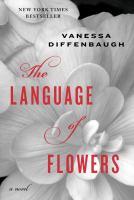
Victoria Jones has just aged out of the foster care system, and her case worker is transporting her to a transitional home. In alternating chapters, the reader watches Victoria make her way in the world while learning about her past. Whether looking forward or back, her past, present, and future are riveting.
Like those chapters, I alternately wanted to shake the adult Victoria by the shoulders, and hold little Victoria in my lap. Through her gift with flowers, Victoria meets an array of insightful, compassionate, and loving people. Through the ghosts of her past, she pushes them away.
Victoria uses the language of flowers, the meanings assigned to particular plants, to heal strangers she meets in her work at a flower shop. She uses the language of flowers to express emotions to those she wishes to love. And she uses the language of flowers to eventually heal herself.
At turns difficult, frustrating, and confusing, The Language of Flowers offers hope and compassion to those damaged by life’s brutality.
Readers who appreciated the plight of foster children in Janet Fitch’s White Oleander will find similar themes here. Chris Bohjalian’s The Buffalo Soldier offers insight into the foster care system from a foster family’s point of view and is equally gripping in its way.
